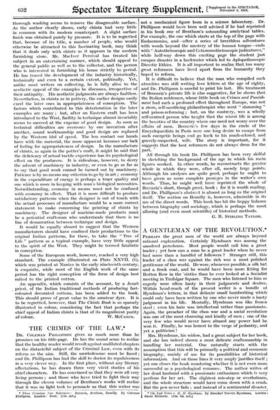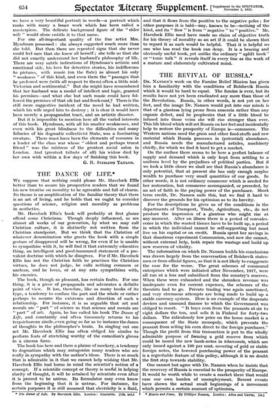A GENTLEMAN OF THE REVOLUTION.*
PERHAPS the great men of the world are always beyond rational explanation. Certainly Hyndma.n was among the unsolved paradoxes. Most people would call him a great leader ; yet how can a man be a great leader when he never had more than a handful of followers ? Stranger still, this leader of a class war against the rich was a most polished gentleman of the world. He wore, whenever possible, a silk hat and a frock coat, and he would have been more fitting for Rotten Row in the 'sixties, than he ever looked at a Socialist meeting in Trafalgar Square. The men who listened to him so eagerly were Often hasty in their judgments and desires. Within hand-reach of the present writer is a bundle of Hyndman's letters, in that delicate small handwriting which could only have been written by one who never made a hasty judgment in his life. Mentally, Hyndman was like frozen steel ; even his hate was intellectual rather than passionate. Again, the preacher of the class- war and a social revolution was one of the most charming and kindly of men ; one of the very few who would never have abused any power had he- won it. Finally, he was honest to the verge of pedantry, and yet a politician !
Mrs. Hyndman, his widow, had a great subject for her book, and she has indeed shown a most delicate craftsmanship in handling her material. One naturally starts with the assumption that this will be primarily a political and economic biography, mainly of use for its possibilities of historical information. And on those lines it very amply justifies itself ; yet one closes the book wondering whether it is not even more successful as a psychological *romance. The author writes of her dead husband with a passionate enthusiasm which is very- perilous for her art. The slightest mis-step or overbalance, and the whole structure would have come down with a crash. But the pen never fails ; and instead of a sentimental disaster,
• The Last Years o II. M. Hyndman. By Rosalind Travers Hyndman. London: Grant Richards. [10s. Gd. net4
we have a very beautiful portrait in words—a portrait which ranks with many a lesser work which has been called a masterpiece. The delicate background figure of the "elder wife" would alone entitle it to that name.
For one all-important quality of the fine artist Mrs. Ilyndman possessed : she always suggested much more than she told. But then there are repeated signs that she never could feel sure that she knew all herself ; she tells us that she did not exactly understand her husband's philosophy of life. There are very subtle indications of Hyndman's artistic and emotional side, his love for detective stories, his indifference to pictures, with music (on the flute) as almost his only " weakness " of this kind, and even there the "passages that he preferred were (with all respect to them) often a little mid- Victorian and sentimental." But she might have remembered that her husband was a model of intellect and logic, granted his premises—and what else but such music could have fol- lowed the premises of that sik hat and frock coat? There is the still more suggestive incident of the novel he had written, which his wife urged him to destroy ; it is clear it would have been merely a propagandist tract, and an artistic disaster.
But it is impossible to mention here all the varied interests of this book. Hyndman, with all his smaller weaknesses, and even with his great blindness to the difficulties and many fallacies of his dogmatic collectivist State, was a fascinating creature. There must have been the elements of romance in a leader of the class war whose "oldest and perhaps truest friend" was the mistress of the greatest social salon in London. And (greatest tribute of all) his widow died by her own wish within a few days of finishing this book.
G. R. STIRLING TAYLOR.



























































 Previous page
Previous page